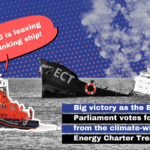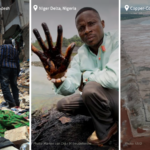During today’s Western Balkans Summit taking place in Vienna, representatives of the European Commission, including Maroš Šefčovič, Federica Mogherini and Johannes Hahn will be looking for means to revive the stalled EU accession talks with the countries of the Western Balkans. In a report published today, Climate Action Network Europe argues that they should use the framework of the Energy Union to advance integration in the field of energy and thus bring dirty energy systems of the Western Balkans closer to the EU standards. So far the Commission has missed important opportunities to stop new, highly polluting coal investments in the region.
Climate Action Network Europe calls on the European Commission to use the Western Balkans Summit as an opportunity to accelerate the energy transition away from coal, in favour of more energy efficiency and renewables in the region.
Recent lack of tangible progress in the accession talks results in the Western Balkan countries losing appetite for much needed energy system reforms – Dragana Mileusnić, Energy Policy Coordinator for South East Europe of Climate Action Network (CAN) Europe said. They are locking their dirty energy systems into outdated and heavily polluting coal infrastructure for decades to come. Moreover, the EU’s influence in the region is taken over by Chinese investors, participating in nearly every new coal project planned.
In a report published today titled “Beyond borders: how Energy Union can turn the tide against coal in the Western Balkans” CAN Europe argues that the idea of the Energy Union, which, according to Vice-President Šefčovič, does not stop at EU borders, has offered many avenues for advancing cooperation with the Western Balkans in the field of energy.
The Energy Union Roadmap envisages a reform of the dysfunctional Energy Community Treaty, which should tune energy and climate policies of the Western Balkans to EU principles. It also lays out a plan to pursue climate diplomacy, encouraging the Western Balkan countries to submit ambitious climate pledges ahead of the next UN climate summit in Paris in December.
The Commission has so far failed to use the opportunities provided by the Energy Union Strategy. Its activities in the region have been solely promoting gas infrastructure, instead of tapping into the vast potential of energy efficiency and renewables – Mileusnić added. As the first step, Vice-President Šefčovič should use Vienna summit to ensure that the Energy Community reform is more than just a cosmetic change.
Notes:
[1] CAN Europe, “Beyond borders: how Energy Union can turn the tide against coal in the Western Balkans”, August 2015, https://caneurope.org/docman/position-papers-and-research/coal-2/2676-beyond-borders/file
[2] The Western Balkans comprises six states: Albania, Bosnia and Herzegovina, Kosovo*, FYR of Macedonia, Montenegro and Serbia.
* The designation is without prejudice to positions on status, and is in line with UNSCR 1244/1999 and the ICJ Opinion on the Kosovo declaration of independence.
[3] Energy system in the Balkans is currently heavily reliant on coal. About 6 GW of coal power capacity more are planned to be built by 2030. Existing plants are old and pollute heavily: health costs of air pollution are responsible for about 20% of national GDP in the region, on average.
[4] Today’s summit in Vienna happens within a framework of the so-called Berlin process, which started last year with a high level conference hosted by the German Chancellor Angela Merkel. The process is aimed at reviving accession talks with the region and bringing about real change, through economic cooperation and the energy and transport connectivity agenda. At this year’s meeting, the Western Balkans’ leaders are expected to agree on a list of five priority energy infrastructure projects that will receive EU funding in 2016.
Contact
Dragana Mileusnic, CAN Europe Energy Policy Coordinator for South East Europe, dragana@caneurope.org, +32 471 43 84 42
Ania Drazkiewicz, CAN Europe Communications Coordinator, ania@caneurope.org, +32 494 525 738



